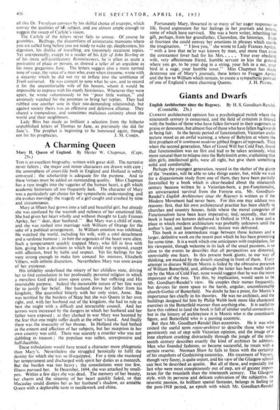A Charming Queen
THIS is an excellent biography, written with great skill. The narrative never falters ; the major and minor characters are drawn with care ;
the atmosphere of court-life both in England and Holland is subtly conveyed ; the scholarship is adequate for the purpose. And to these virtues must be added an outstanding quality. Miss Chapman has a rare insight into the vagaries of the human heart, a gift which academic historians all too frequently lack. The character of Mary was a particularly apt choice for her sympathetic understanding, and she evokes movingly the tragedy of a girl caught and crushed by time and circumstance.
Mary at fifteen had grown into a tall and beautiful girl, but already she was confused by' the warmth and richness of her emotional life.
She had given her heart wholly and without thought to Lady Frances Apsley, her " dear, dear husband." But Mary was a child of state, and she was rushed into marriage with William of Orange for the sake of a political arrangement. In William emotion was inhibited.
He watched the world, including his wife, with a 001 detachment and a sardonic humour ; to him the urgencies of the heart were alien.
Such a temperament quickly trapped Mary, who fell in love with him, giving him a devotion to which he could not respond, except with affection, bred by habit and respect. Yet his feelings for her were strong enough to make him conceal his mistress, Elizabeth Villiers, with infinite discretion. Nevertheless Mary was soon aware of her existence.
His infidelity underlined the misery of her childless state, driving her to find consolation in her profoundly personal religion in which a merciless God piled cross upon cross, for her suffering and His inscrutable purpose. Indeed the inexorable nature of her fate went far to justify her belief. Her husband drove her father from his kingdom. She quarrelled bitterly with her only sister, Anne. She was terrified by the burdens of State but she was Queen in her own right, and, with her husband out of the kingdom, she had to rule as best she might with a difficult and intractable council. And her terrors were increased by the dangers to which her husband and her father were exposed ; as they clashed in war Mary was haunted by the fear that one might suffer death at the other's hand. And finally there was the insecurity of her throne. In Holland she had bathed in the esteem and affection of her subjects, but her reception in her own country was cold. There was scarcely a courtier who was not dabbling in treason ; the populace was sullen, unresponsive and half-Jacobite.
These tribulations would have tested a character more phlegmatic than Mary's. Nevertheless she struggled heroically to fulfil the destiny for which she was so ill-equipped. For a time she mastered her temperament and discharged with spirit her duties as a monarch. But the burden was too heavy ; the consolations were too few. Illness pursued her. In December, 1694, she was attacked by small- pox. Within a few days she was dead. The memory of her beauty, her charm and the sincerity of her heart quickly faded, so that Macaulay could dismiss her as her husband's shadow, an amiable Queen with a deplorable taste in needlework and china. Fortunately Mary:thwarted in so many of her eager responses to life, found expression for her feelings in her journals arld letters, some of which have survived. She was a born writer, inheriting her gift, perhaps, from her grandfather, Clarendon, the historian. Even at fourteen she could convey her emotions in phrases which stank the imagination. " I love you," she wrote to Lady Frances Apsley, " with a love that ne'er was known by man, and more than even the constantest lover had for his Mrs.. . . . Your ever obedient wife, very affectionate friend, humble servant to kiss the ground where you go, to be your dog in a string, your fish in a net, your bird in a cage, your humble trout." Miss Chapman has made dexterous use of Mary's journals, these letters to Frawes Apsley and the few to William which remain, to create a sympathetic portrait
of one of England's most charming Queens. J. H. PLUMB.


































 Previous page
Previous page